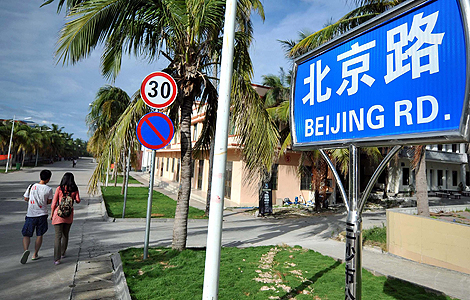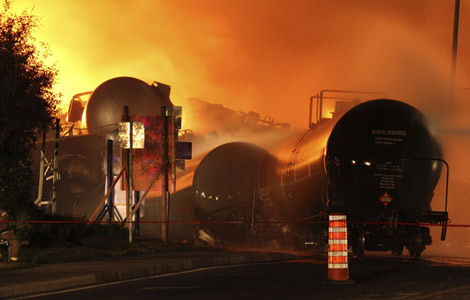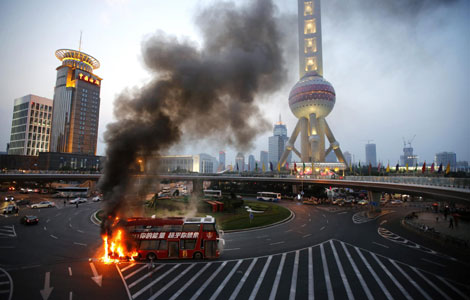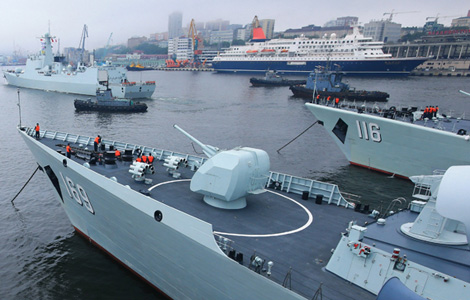Quebec disaster death toll jumps to 13
Updated: 2013-07-09 07:26
(Agencies)
|
||||||||
BRAKES FAILED, SAYS CHAIRMAN
The problem was that the engine had been left on by the train's engineer to maintain pressure in the air brakes, Ed Burkhardt, chairman of Montreal, Maine & Atlantic Railway (MMA), said in an interview. As the pressure gradually "leaked off," the air brakes failed and the train began to slide downhill, he said.
![An aerial view of burnt train cars after a train derailment and explosion in Lac-Megantic, Quebec July 8, 2013 in this picture provided by the Transportation Safety Board of Canada. [Photo/Agencies] Quebec disaster death toll jumps to 13](../../attachement/jpg/site1/20130709/d4bed9d4d2201345901002.jpg) |
|
An aerial view of burnt train cars after a train derailment and explosion in Lac-Megantic, Quebec July 8, 2013 in this picture provided by the Transportation Safety Board of Canada. [Photo/Agencies] |
The fire service said it contacted a local MMA dispatcher in Farnham, Quebec, after the blaze was out. "We told them what we did and how we did it," Lambert said.
Asked whether there had been any discussion about the brakes, he replied: "There was no discussion of the brakes at that time. We were there for the train fire. As for the inspection of the train after the fact, that was up to them."
It was not immediately clear what the MMA dispatcher did after speaking with the fire service. Burkhardt said the fire service should have also tried to contact the train's operator, who was staying at a nearby hotel.
"If the engine was shut off, someone should have made a report to the local railroad about that," he said.
Andre Gendron, 38, lives on a wooded property next to the rail yard in Nantes. He said he was burning a campfire outside his trailer on Friday night when he heard the fire trucks.
"About five minutes after the firemen left, I felt the vibration of a train moving down the track. I then saw the train move by without its lights on," Gendron told Reuters.
"I found it strange its lights weren't on and thought it was an electrical problem on board. It wasn't long after that I heard the explosion. I could see the light from the fires in Lac-Megantic."
The center of Lac-Megantic, a lakeside town of 6,000 near the border with Maine, was still cordoned off on Monday morning. One of the destroyed buildings was a music bar popular with young people, and witnesses reported fleeing the area around the building as the heat and flames closed in.
Canadian crash investigators said they will look at the two sets of brakes on the train, the airbrakes and the handbrakes.
Burkhardt said that after the pressure leaked out of the airbrakes, the handbrakes would not have been strong enough to keep the train in place.
Montreal Maine & Atlantic is one of many North American railroads that have vastly stepped up shipments of crude oil as pipelines from North Dakota and from oil-producing regions in Western Canada fill to capacity, and the accident is bound to raise concern about the practice of transporting oil by rail.
(Additional reporting by Julie Gordon in Lac-Megantic; Writing by David Ljunggren and Janet Guttsman; Editing by Peter Galloway and Eric Walsh)

 China's youngest city glistens under palm trees
China's youngest city glistens under palm trees
 Xinjiang tourism recovering
Xinjiang tourism recovering
 Quebec disaster death toll jumps to 13
Quebec disaster death toll jumps to 13
 Mourn for students in San Francisco air crash
Mourn for students in San Francisco air crash
 Rolling stone finally settles
Rolling stone finally settles
 Double-decker bus caught fire in Shanghai
Double-decker bus caught fire in Shanghai
 China, Russia begin live-fire navy drill
China, Russia begin live-fire navy drill
 Grape expectations for Xinjiang county
Grape expectations for Xinjiang county
Most Viewed
Editor's Picks

|

|

|

|

|

|
Today's Top News
Thousands flock to Texas Capitol over abortion
China improves maritime law enforcement
Air crash victims' families arrive in SF
Hopes are high for US, China talks
Laden's life on the run revealed
US mulls hastening withdrawal from Afghanistan
China's inflation grows 2.7% in June
Country singer Randy Travis in critical condition
US Weekly

|

|







